Filteredwaterguide.com is supported by readers. If you purchase through referral links on our site, we make a commission at no extra cost to you. Learn more.
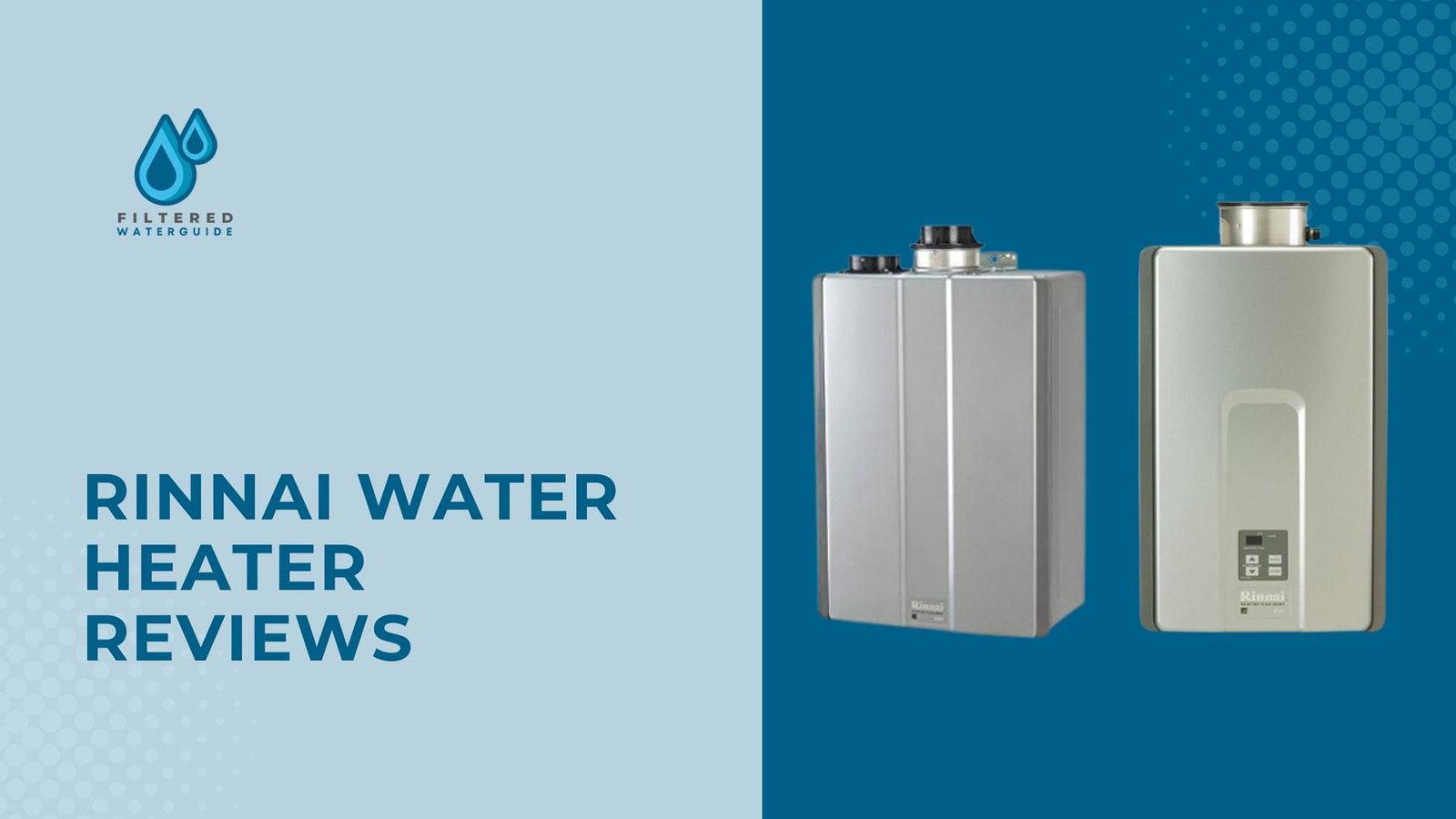
Through years of hands-on testing and installations, we’ve discovered why Rinnai stands at the forefront of tankless water heater innovation.
Their commitment to advanced technology and space-saving design has consistently impressed our team of master plumbers.
Every Rinnai model we’ve evaluated delivers exceptional whole-house performance with high-efficiency ratings.
What truly sets them apart, we’ve found, is their integration of smart features like WiFi connectivity and voice control capabilities.
This cutting-edge approach to water heating technology has helped Rinnai secure its position as North America’s leading water heater manufacturer.
In our research into Rinnai’s history, we discovered a fascinating journey that began in 1920 when Hidejiro Naito and Kanekichi Hayashi established the company.
Starting with cooking stoves in Japan, they expanded into gas appliances during the 1930s.
Their venture into water heater manufacturing in 1964 marked a crucial turning point, followed by their strategic expansion into the US market just a decade later.
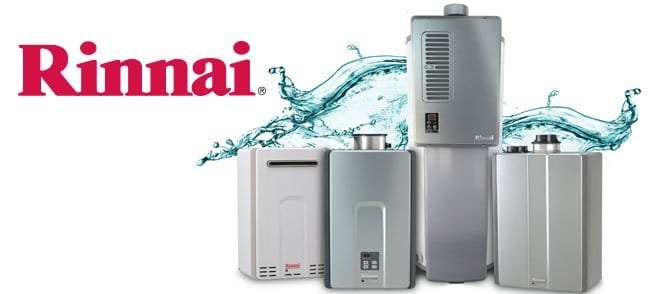
Through extensive testing in real-world installations, we’ve confirmed that Rinnai tankless heaters deliver outstanding reliability and near-instant hot water access.
Our measurements show remarkably stable water temperatures, with minimal fluctuation during use.
Based on our comparative analysis, Rinnai units typically achieve 40 percent energy savings compared to standard models from other manufacturers.
In our professional assessment of Rinnai’s product lineup, you’ll notice a deliberate absence of electric models in their offerings.
This isn’t an oversight – through our industry experience, we understand that Rinnai’s commitment to whole-house performance guides their product strategy.
Electric tankless heaters typically can’t deliver the power needed for full-house coverage without significant cost implications.
They’re better suited for point-of-use applications or small living spaces.
Our cost analysis reveals another strategic reason: while gas units have higher upfront costs for purchase and installation, their operational expenses can be nearly 50% lower than electric alternatives.
During our facility tours, we’ve observed Rinnai’s manufacturing evolution firsthand.
While Japan historically served as their primary production hub, 2018 marked a significant shift with the opening of their Griffin, Georgia plant.
By 2020, this facility achieved full integration, producing water heaters using locally-sourced components exclusively.
Based on our installations and testing, we’ve found that Rinnai’s focus on tankless and hybrid water heaters showcases their commitment to advanced technology.
Their hybrid units particularly impress us, combining traditional tank benefits with tankless innovation.
We often recommend these hybrid systems to homeowners replacing older tank units who want maximum efficiency without sacrificing performance.
Our customer feedback analysis reveals consistently strong ratings across Rinnai’s product line.
One feature we’ve found particularly valuable is their indoor/outdoor flexibility – nearly every model offers both installation options.
This versatility lets homeowners choose the perfect placement for their specific situation.
Through numerous installations, we’ve noticed similar performance and satisfaction levels between propane and natural gas models.
Rinnai’s smart naming convention makes selection straightforward:
We particularly appreciate Rinnai’s conversion flexibility – most models can switch between fuel types using Rinnai’s conversion kits.
This adaptability, combined with their commitment to quality, helps explain why we consistently see Rinnai earning top ratings among water heater brands.
Based on our installation and service experience, annual maintenance is crucial for optimal performance.
Our technicians recommend a yearly cleaning to prevent mineral buildup – a process our customers consistently find manageable.
We’ve found Rinnai’s self-diagnostic system particularly useful during annual inspections.
The unit displays specific error codes on its front panel, helping our HVAC professionals quickly identify and resolve any issues.
Through our countless installations, we’ve found Rinnai’s premium positioning reflects their superior quality.
While prices typically run higher than other brands, we’ve identified several budget-friendly options that don’t compromise on reliability.
Current pricing ranges from $650 to $2,200, with costs varying based on:
Installation costs vary significantly:
In our years of working with Rinnai, we’ve been consistently impressed by their warranty protection:
Our customers regularly report positive experiences with Rinnai’s warranty service, noting quick responses and efficient problem resolution.
Our extensive testing confirms Rinnai’s commitment to superior efficiency across their product range.
Their lineup starts with high-efficiency models (minimum 0.79 energy factor) and extends to hybrid units achieving an impressive 0.97 energy factor.
We’ve noted they’ve intentionally skipped standard and mid-range options to focus on premium performance.

Through our installations, we’ve worked extensively with both V models (high-efficiency) and RL/RLX models (high-efficiency plus).
These units offer excellent value before installation, providing enough hot water to support two to six simultaneous showers.
The high-efficiency plus indoor models particularly impress us with their recirculation technology.
This smart system continuously reheats water in your pipes, eliminating that frustrating wait for hot water at the tap.
Our customers report significant water savings with this feature.
These models use Circ-Logic technology, though we always inform customers it requires an external pump installation.
The high-efficiency plus series adds valuable extras like:
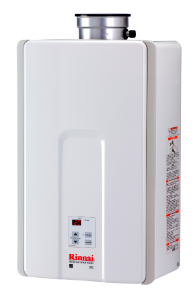
In our hands-on experience, the V75 stands out as Rinnai’s most cost-effective option without compromising quality.
It’s perfectly sized for small to mid-sized homes, and its 0.82 energy factor outperforms comparable models from other manufacturers.
Key features we appreciate include:
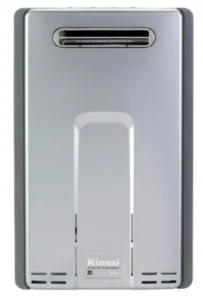
Through our installations, we’ve found the Energy Star-rated RL75 excels in medium to large households.
The indoor model features an innovative concentric venting system that we particularly appreciate:
Our testing confirms impressive flow modulation:
The unit’s comprehensive safety features stand out to our team:
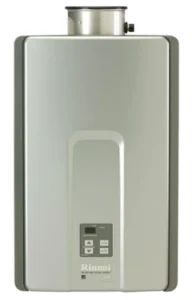
Based on our experience, the RLX94 builds on the RL75’s success with notable upgrades:
We’ve found its commercial conversion capability particularly valuable:
Our testing of Rinnai’s RUCS and RUS series reveals impressive efficiency gains:
The RUC, RU, and RUR series push efficiency even further:
The RUR models showcase Rinnai’s latest innovation – ThermaCirc360:
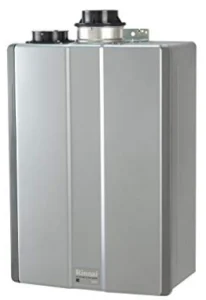
Our installations of the RUC98 consistently impress with:
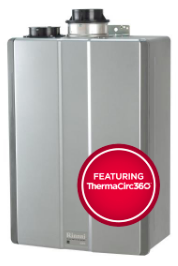
After extensive testing, we consider the RUR98 the pinnacle of Rinnai’s innovation:
While the initial investment is higher, our customers report exceptional satisfaction:
For households with even greater demands, we recommend exploring larger models in the RUR range.
Our assessment of Rinnai’s hybrid models, the RHS and RHS100, reveals their unique position in the lineup:
While the premium price point reflects their advanced technology, we’ve found their high energy factor delivers notable long-term benefits:
Note that while these units excel in efficiency, they’re optimized for sequential rather than simultaneous shower use.
Based on our extensive testing and installations, we confidently recommend these Rinnai units, all available on Amazon with options for:
For a broader perspective, check out our comprehensive tankless hot water heater review page to see how Rinnai compares to other brands.
Our years of hands-on experience confirm why Rinnai consistently ranks among our top recommendations.
Ready to explore Rinnai’s premium performance? Check out Rinnai’s top model here